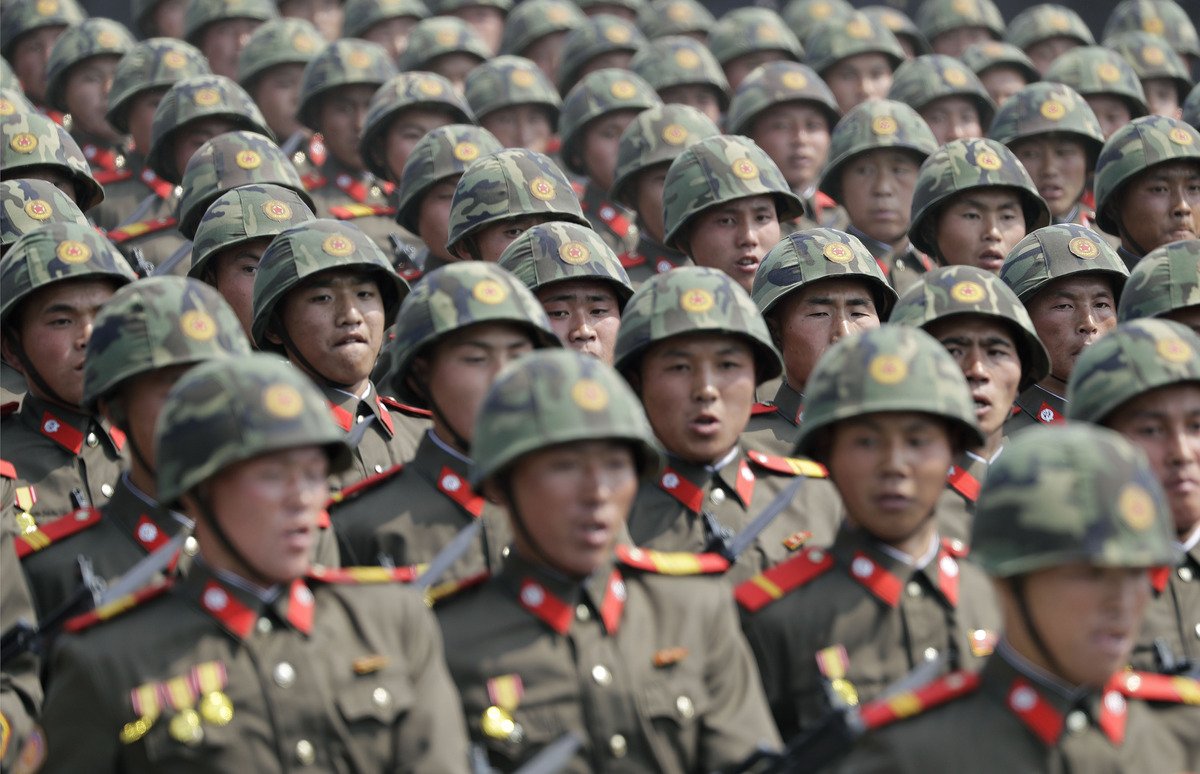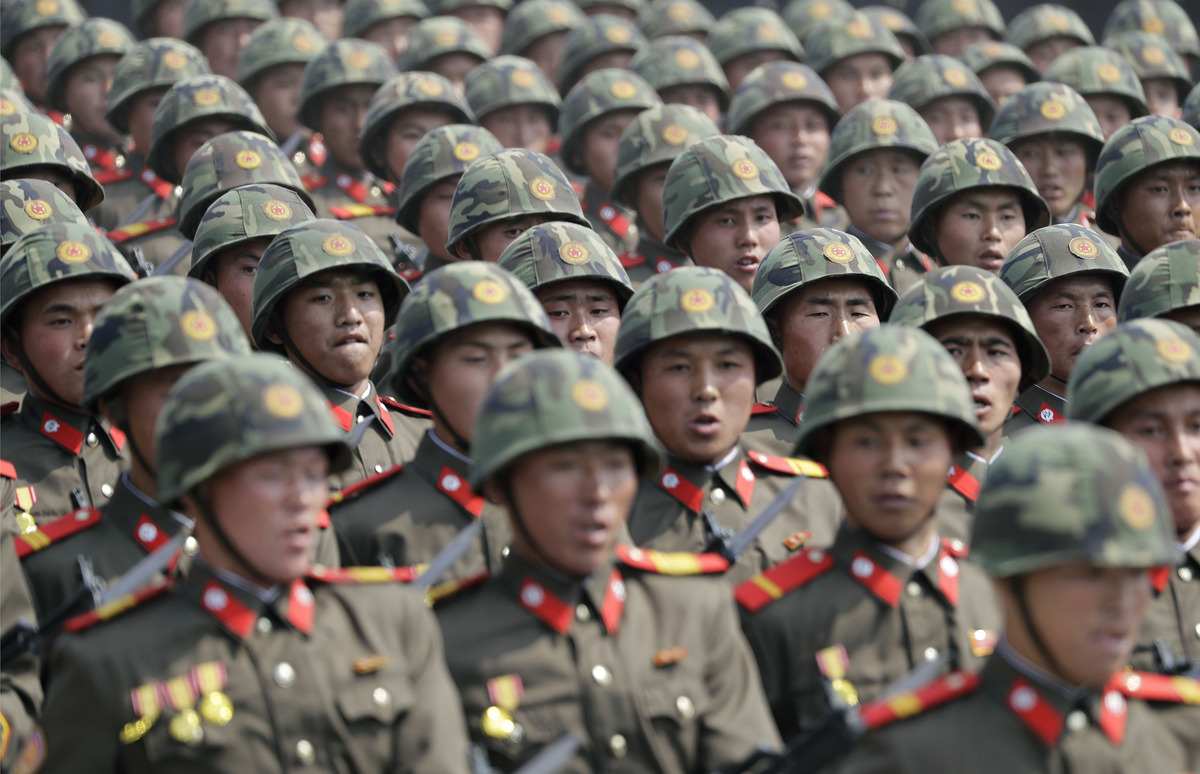The South Korean government “will never sit idle,” Seoul’s ambassador to London has said, as the U.S. ally worries that North Korean troops deployed alongside Russian forces against Ukraine could accrue valuable combat experience far from the Korean Peninsula.
Seoul will “keep a close eye” on North Korea’s entanglement in Russia’s war effort against Ukraine, and will “take active measures in stages based on levels in military cooperation between Moscow and Pyongyang,” Yoon Yeocheol, South Korea’s representative to the U.K., told Newsweek.
U.S., Ukrainian and South Korean intelligence has indicated between 10,000 and 12,000 North Korean fighters, including soldiers from Pyongyang’s elite forces, had arrived in Russia’s Kursk region in recent weeks. Estimates from Kyiv put the number at roughly 15,000.
Pyongyang could send up to 100,000 soldiers to Russia through several deployments, Bloomberg reported on Sunday.

Soldiers march across Kim Il Sung Square during a military parade in Pyongyang, North Korea, on April 15, 2017. Seoul will “keep a close eye” on North Korea’s entanglement in Russia’s war against Ukraine, Yeocheol…
Soldiers march across Kim Il Sung Square during a military parade in Pyongyang, North Korea, on April 15, 2017. Seoul will “keep a close eye” on North Korea’s entanglement in Russia’s war against Ukraine, Yeocheol Yoon, the South Korean ambassador to the U.K., told Newsweek.
More
AP Photo/Wong Maye-E
“The scale of deployed North Korean troops is being closely watched,” said Yoon.
South Korea has refused to directly give lethal aid to Ukraine, but has reportedly provided hundreds of thousands of much-needed artillery rounds via the U.S.
Yoon said Seoul was sending $400 million to Kyiv for equipment like generators, needed across Ukraine’s energy, health and education sectors. South Korea is planning another, longer-term support package worth over $2 billion, the envoy added.
But since detecting North Korean troops traveling to Russia—and then kitted out in Moscow’s military garb—officials in Seoul have signaled an increased willingness to rethink their long-held policy on lethal aid.
“We would consider supplying weapons for defensive purposes as part of the step-by-step scenarios, and if it seems they are going too far, we might also consider offensive use,” a South Korean presidential official said in October.
“The Republic of Korea is coordinating with its allies, committed to providing the support that Ukraine requires to secure a just and lasting peace,” the ambassador said, referring to South Korea by its official title.
Ukraine’s defense minister, Rustem Umerov, told South Korean media earlier this month that the first “small-scale clashes” between Ukrainian soldiers and North Korean fighters had taken place, but Kyiv could not yet verify how many casualties North Korea had sustained nor how many of its soldiers had become prisoners of war.
“It is deeply regrettable that, in an attempt to maintain its dictatorship, North Korea is disregarding the lives of its people and turning young North Koreans into ‘cannon fodder,'” said Yoon.
Many of those who pass through North Korea’s military training end up in nonmilitary tasks like farming and construction, without much intensive combat instruction at all, Ji Hyun Park, a North Korean defector, now a senior fellow for human security at the Center for Asia Pacific Strategy, previously told Newsweek.
It is unlikely all of those sent to Russia will be part of Pyongyang’s vaunted Storm Troops, or elite fighters trained for infiltration and assassination, Park said.
But the fighters who emerge the other side of these clashes will have firsthand experience of battle, something North Korea’s vast military of more than a million soldiers doesn’t currently have. Although the war between North and South Korea never officially ended, an armistice has been in place on the peninsula since 1953.
“We are concerned that North Korea will accumulate combat experience, secure actual operational data for its weaponry, acquire funding for nuclear and missile development through Russia’s economic support, and potentially receive assistance from Russia to advance military technology, as well as modernize its conventional weapons,” Yoon said.
South Korea’s biggest threat is its northern neighbor, which has drawn closer to Russia since the start of Vladimir Putin‘s full-scale invasion of Ukraine. Moscow has become a pariah nation among countries backing Kyiv, and signed a mutual defense pact with Pyongyang earlier this year.
North Korea has become a major source of munitions and missiles for Russia, keeping the Kremlin’s arsenal stocked while testing out weapons like its homegrown ballistic missiles in real combat conditions.
North Korea is thought to be receiving an economic leg up from Russia, as well as supplies like food, plus assistance with advancing its nuclear development programs. This goes against United Nations sanctions, and has been widely condemned.
Pyongyang has carried out multiple missile tests this year—involving its Hwasong-19 intercontinental ballistic missile in recent weeks—which have been paired with saber-rattling rhetoric from the secretive nation. It has officially veered off the path of reconciling with the South this year, Pyongyang branding Seoul its “principal enemy” as well as blowing up parts of roads and railway lines heading for the border dividing the peninsula.
North Korea has repeatedly launched balloons filled with trash into South Korea in what Yoon described as a “despicable provocation.” Upward of 6,000 balloons have been recorded crossing into South Korea, the diplomat said, marrying up with similar assessments from other South Korean officials.
South Korea’s military said on Monday that it had detected balloons from the North for the first time in weeks, according to local media.
South Korean activists have long sent balloons northward, filled with leaflets targeting the regime in Pyongyang. Kim’s influential sister, Kim Yo-jong, said on Monday that Seoul “will have to pay a dear price,” and that North Korea’s territory was “being polluted,” according to state media.
“The compensation that North Korea will receive [from Russia] in return for its provision of military personnel and arms will likely be used to target us through provocations and threats,” Yoon added.
There are pressing questions over how President-elect Donald Trump, who will stride back into the Oval Office in early 2025, will handle relations between Washington and Pyongyang. North Korea has grown stronger in the years since Trump’s first presidency, when the Republican met Pyongyang’s supreme leader several times.
South Korea and neighboring Japan, two major U.S. treaty allies, have turned to Washington for additional support, angering Pyongyang. Seoul’s alliance with the U.S. “is stronger than ever,” Yoon said.
South Korea, Japan and the U.S. have held joint military exercises this month. North Korea’s KCNA state news agency described the drills as “war of aggression exercises aimed at our sacred nation.”
